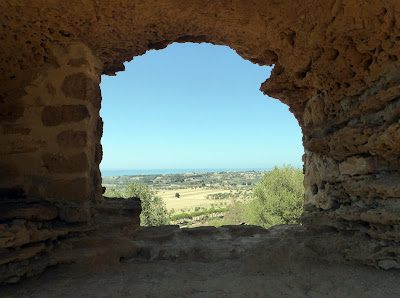I am a huge fan of UNESCO. I know the great work they do around
the world and for many, many years, wherever we have traveled in the world as
a family, UNESCO sites have been on the itinerary, which might I guess go some
way to explaining why my children ended up reading history and conservation at
university!
It has been a silly little personal ambition, I know, to visit the
site that inspired the UNESCO logo - those Doric temple columns. Today, glimpsing the inspiring columns
towering on the cliff top through the branches of an 800 year old olive tree
planted in early medieval times, it was everything I had hoped for.
The columns stood proudly above the plains on the edge of the golden sandstone bluff, the ancient rocky layers a mixture of browns, yellows and oranges in the early morning sun. Once upon a time, a very long time ago, these worn and faded sculpted columns would have glistened blindingly in the sun, their outer layers covered in white marble and alabaster. Approaching invading armies from the seas would have seen these temples on their high cliff line across the fertile coastal plains and quaked, for these divine palaces of worship and meeting would have been majestic, flaunting their builders wealth, engineering skills and strong relationships with their deities.
Across the plains below, the city inhabitants would toil in the sun, tilling the soil, tending the olive trees, cutting the wheat and pruning vines. Children would have played in the citrus groves and tended the goats and sheep.
The Concordia Temple, is in the Valle del Tempi, south of the
city of Agrigento. It is the inspiration for the UNESCO logo and it stands proudly on the top of a three kilometre long sandstone cliff line along with two other magnificent temple ruins.
Starting at the top with the temple of Juno, we
walked down the slight incline along the stone paved road admiring the ancient
city walls of former Akragas.
To the north across the rising hill slopes towards where modern
Agrigento is today, was where the ancient city grew. Roads, houses, shops, bars and
bakeries; workshops, forges and more; all south facing to make the most of the
Mediterranean sun and breezes.
Within the walls of this once great city can still be found the
carved large semi-circular indentations, each with a deeply carved base......the
necropoli. Tradition had it that the dead were buried in these tombs within the
city walls. I've seen something similar in Roman Pompeii. Seeing one mid-twenties Italian guy climbing
into one to show off to his girlfriend was I feel taking matters a little too
far and for a few minutes ruined my sense of history that was developing but it
soon recovered.
To wander among the scattered fallen columns and blocks from
the temple of Hercules was to wonder about the ancient building techniques,
craftsmen and slaves working to create buildings that have withstood the test
of time. And yes, it was hot, another searing 36C with scant shade, especially
on the lower site. But it was worth it and if clever, you dart between the
shadows of walls, bushes and olive trees. In fact I am quite taken aback at how
much temperature difference there is between out in the sun and under the shade
of a densely branched olive tree. It is substantial!







































No comments:
Post a Comment